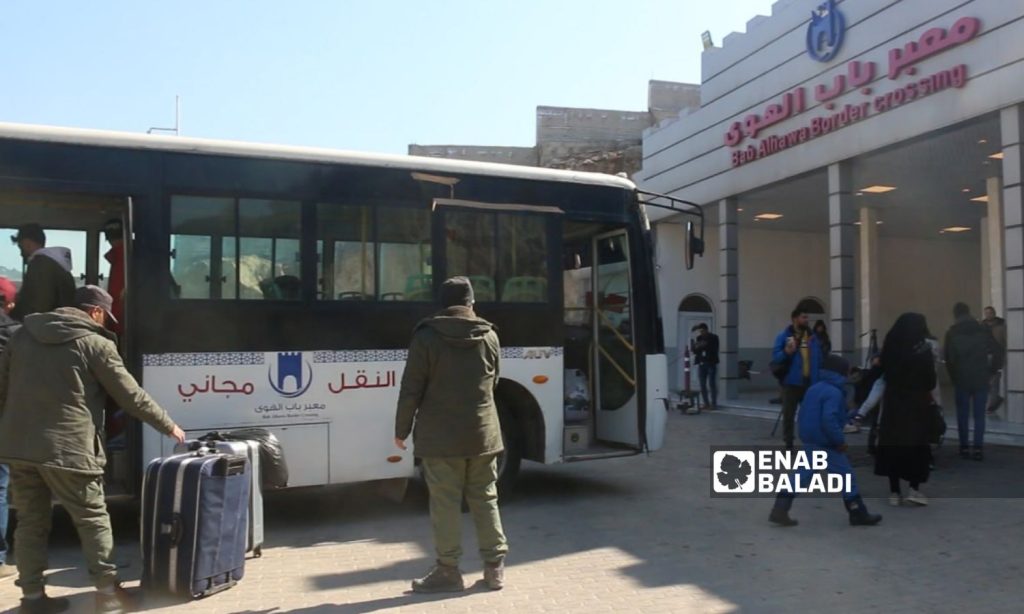Enab Baladi – Idlib
“The house fell on us, but Allah saved us, and we were able to come out immediately. We stayed in the rain on the roads for more than a week”. In those words, Abd al-Hadi al-Barkawi (81) and his wife described to Enab Baladi the first week they lived in Turkey following the devastating earthquake.
Al-Barkawi lived for almost nine years in Turkey. He returned to northern Syria days ago through the Bab al-Hawa border crossing with Turkey to the city of Azaz in the countryside of Aleppo after his rented house was demolished as a result of the earthquake that struck 10 Turkish provinces and four Syrian governorates on February 6.
Mardiya al-Halabi is a woman who also crossed to the north on “vacation” from Turkish Antakya. “She came out from under death,” she said while heading towards the town of Aqrabat in the city of Idlib, northern Syria, to spend her “vacation” with her daughter, who lives in the said region.
The situation of most Syrians in the affected areas is similar in terms of their inability to go to other provinces due to the high cost of living or the ability to obtain a place to reside amid large numbers of Turks and foreigners who are residents in earthquake-stricken provinces, heading to other provinces that were not affected by the earthquake.
The dire economic situation and the lack of relatives in those provinces prompted some Syrians to take advantage of the “temporary vacation” decision and spend the permitted period on Syrian territory.
Conditional “vacation”
Since the first day of opening the conditional “vacation” to Syria, hundreds of Syrians have returned through the Tal Abyad border crossing. With several additional crossings allowing them to cross northward, the numbers have risen to more than thousands.
The Bab al-Hawa, Tal Abyad, and Bab al-Salama border crossings with Turkey have previously declared that all Syrians residing in all Turkish provinces who are holders of the Temporary Protection Card (Kimlik) will be allowed a temporary visit to Syria, subject to conditions, provided that the minimum period of their stay is one month from the date of entry (three months solely through the Bab al-Hawa border crossing), and that the period of their stay within the Syrian territory does not exceed six months at most.
Through these crossings, only Syrians residing in the provinces of Gaziantep, Kilis, Kahramanmaraş, Hatay, Osmaniye, Adıyaman, Urfa, Diyarbakır, Malatya, Adana, Elâzığ (Elâzığ Province except for Bab al-Hawa) who hold a Temporary Protection Card (Kimlik) from the affected provinces are allowed to enter Syrian territory.
Fears of not being allowed to return
With every decision to allow Syrians residing in Turkey to visit northern Syria, there is recurring talk about the refugees’ fears of a sudden Turkish decision that prevents them from returning to Turkey after the end of their “vacation.”
Fears were heightened this time due to the conditions imposed on the visit, that the period of stay on Syrian territory should not be less than one month or three months through the Bab al-Hawa crossing.
Earlier, the issue of Syrian visits through Turkish crossings during the holiday period was a pretext for groups of Turkish opposition to demand the deportation of Syrians to the north, which is safe as long as they are able to stay there during the period of their visit.
In response to the opposition’s comments and the demands of Turkish citizens to deport the refugees or keep those who went to Syria there, the Turkish authorities last year prevented these visits and did not allow them in the first place with the aim of absorbing the anger of the street regarding this issue.
The head of the Free Syrian Lawyers, Ghazwan Kronfol, told Enab Baladi that people’s fears are “legitimate,” justifying that in Turkey there are political tensions and hate speech rejecting the presence of Syrians. These factors could alter the official attitude regarding the issue of visits.
The idea of leaving for the country from which the refugee fled as an asylum seeker or refugee is unlawful, according to Kronfol, and the authorities can simply decide that protection is not needed because there are no security concerns that prevent the person from staying in their country of origin for at least three months.
The idea of asylum is based on the fact that human beings could be subjected to persecution, murder, and abuse of their rights, dignity, and humanity and that their survival in their own country or place they are seeking to leave threatens their personal integrity, thus seeking asylum or protection in another country.
Returning to the country of origin during asylum or protection means that the basis for asylum or protection no longer exists, i.e., asylum is no longer necessary.
Upon Syrians’ entry to Turkish territory for the purpose of asylum to escape bombing and death, the Turkish authorities passed the Temporary Protection Regulation and placed Syrians under this law, a temporary protection that ends with the expiration of the reasons for granting it.
Syrians’ departure to Syria and their ability to live under the de facto authorities, according to Kronfol, means that they are safe, and this is confirmed by their taking their families and children. Thus, the requirement to grant asylum is missing in this case.
The total number of Syrian refugees in Turkey is about 3.5 million. Approximately one million 750 thousand of them resided in Turkey’s southern earthquake-stricken cities and provinces.
Gaziantep hosts the largest proportion of Syrian refugees in southern Turkey, with 460,150 refugees, followed by Hatay with 354,000 Syrian refugees, Urfa with 368,000 refugees, and Adana with 250,000 refugees.
About 550,000 refugees live in Kahramanmaraş, Kilis, Adıyaman, Osmaniye, Diyarbakır, and Malatya, according to the latest statistics issued by the Turkish Presidency of Migration Management on February 2.











